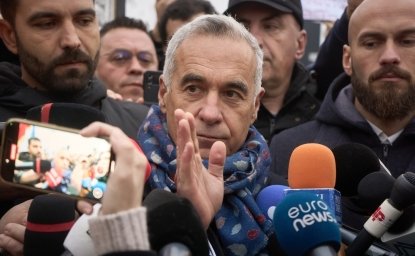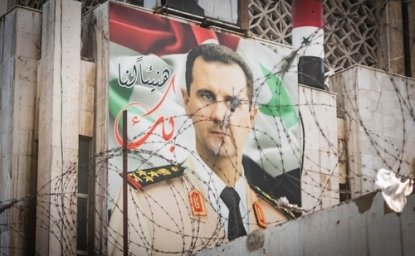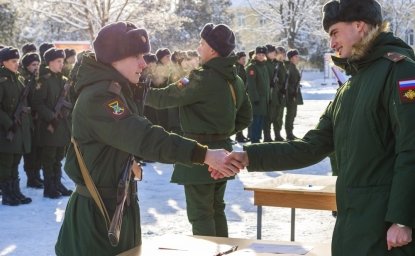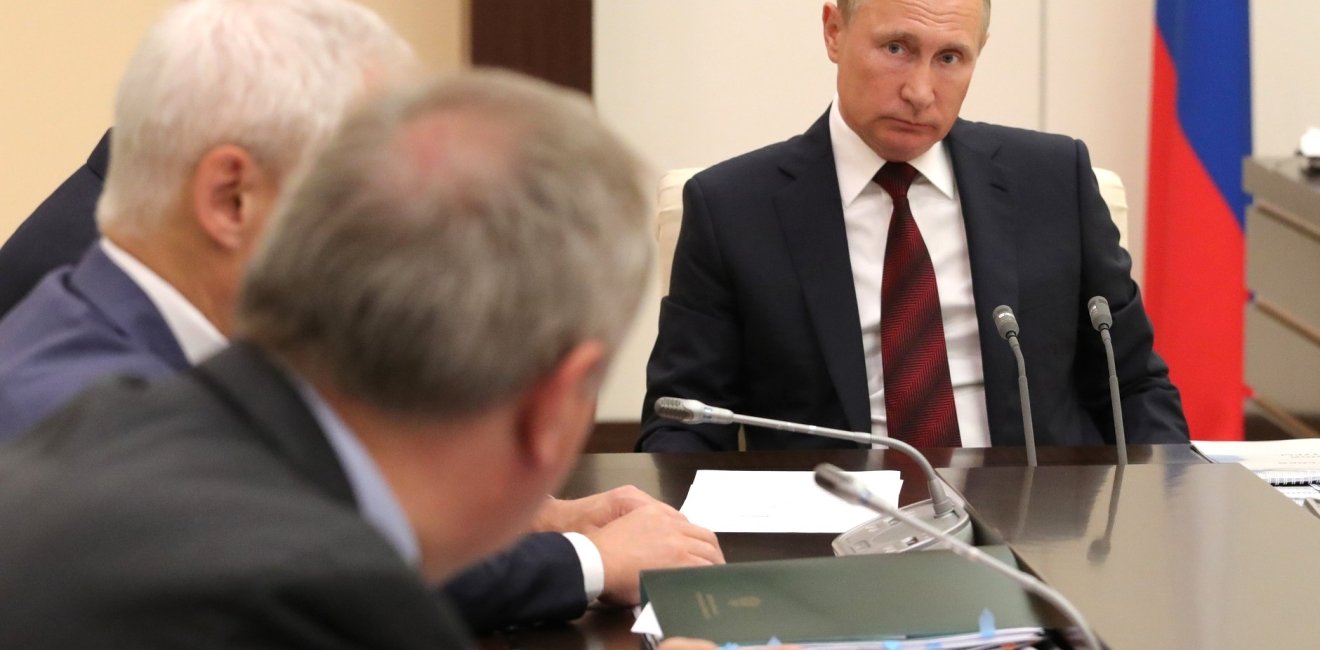
A blog of the Kennan Institute
BY MAXIM TRUDOLYUBOV
When Vladimir Putin in March was reelected unopposed for his fourth term as president of Russia, few imagined he would be mired in multiple crises six months into his officially last term in office. When caught in similarly dire circumstances in the past, Putin has responded by unleashing a crisis of his own making: a military operation abroad or a major political reshuffle at home. How will he respond this time?
For years, state-run television channels have portrayed Putin as a great world leader, not as a mundane domestic politician. Putin can hardly be seen as responsible for the problems of ordinary Russians; rather, he presents himself as their savior. During his annual Q&A sessions with the population he descends from the heights and tries to talk up the economy and issue orders to repair an occasional house or a road.
This carefully curated positioning is eroding. Scandals involving Russian military intelligence agents, caught in the act and deanonymized, are not the kind of material Russian propagandists can use to support an image of a successful international leader. Foreign journalists are also unlikely to continue calling Putin “the most powerful man in the world.”
But the deepest cracks in Putin’s stature are of purely domestic origin. Putin’s famous approval rating, the one that, as measured by the Levada polling organization, floated confidently above 80 percent between the summer of 2014 and the spring of 2018, is now at 67 percent. His disapproval rating, at 33 percent, is the highest since 2013. The popularity of United Russia, the Kremlin’s party, is going down too. The sobering results of Russia’s recent regional elections have acted as a wake-up call to the Kremlin.
To be sure, an overwhelming majority of Russians still say they approve of Putin. And as for the regional elections, the Kremlin did not really “lose” them: whoever won, United Russia or not, had been preapproved by the Kremlin in the first place.
Still, it is clear that the domestic political dynamic is capturing people’s attention; the raised retirement age in particular has proved a strong irritant. In the past, any candidates recommended by Putin were assured of winning their regional election by a landslide. It is no longer a given these days. In a recent series of frantic gubernatorial dismissals and appointments, the Kremlin has tried to make sure its new appointees will be more palatable to the population and will be elected during the next cycle of managed elections, in September 2019.
Faced with similar troubles in the past, Moscow normally would take a twofold path. Out of public view, the presidential administration would tweak its current approach to political appointments, fine-tune its propaganda line, and take other technical steps. The Kremlin would also create a very public crisis in order to turn the tables, create a massive distraction, and start the game all over.
Faced with waning support at home and glaring blunders abroad, the Kremlin would mount a disruptive asymmetric response, create a big splash, and keep everybody, both at home and abroad, on their toes. The annexation of Crimea, the war in Ukraine, and the war in Syria are examples of such moves.
The technical part of the twofold response is well under way. The administration is busy getting rid of the worst-performing governors. It is also fine-tuning its media spin. The TV channel Russia One has just launched a new program devoted entirely to the person of Vladimir Putin. It is not working very well. Even observers loyal to the Kremlin are comparing the Putin show to the kind of television the Soviet Union produced during its twilight days.
The second part of the response is the more interesting part. Does Putin have a mighty asymmetric card up his sleeve? This is the question that defines Russia’s immediate future. A major foreign adventure and a sweeping political reform are the two avenues that the Kremlin, caught in similarly embarrassing predicaments, has taken before.
An invasion of Belarus is on everybody’s mind, but the consensus view among policy watchers in Russia is that an adventure of that sort is out of the question now. The public is tired of the Ukrainian and Syrian crises. Both stories still occupy a huge chunk of airtime on Russia’s state-run television channels, but they have lost their appeal. Television producers are looking for new explosive subjects but do not seem to be particularly successful at finding them.
A major political reform has thus started to dominate the discussion. Getting rid of presidential term limits or creating a new “supreme” position for Putin, or even holding a new election, are some of the scenarios that are rumored to be under consideration. So far, no details can be gleaned from the cautious language put out by officials and political commentators close to the Kremlin.
This does not mean that a major reform will indeed be initiated. Rather, it means that the Kremlin realizes it is in crisis and that a renewed focus on the domestic agenda is inevitable.
The West wants to contain Russia, which is why Russians have to resign themselves to all kinds of privations: that is the message the Kremlin wants to convey to Russian citizens. This discourse has worked wonders for the Kremlin for years, but it seems to be losing steam.
Vladimir Putin’s preeminent political skill has been his ability to stay above the domestic policy fray. This has allowed the presidential administration to isolate Putin from the taint of domestic corruption, bad roads, and decrepit housing. Putin was thus both a great world leader and a national champion.
We will now see if this legend is sustainable. When people say “all politics is domestic,” they do not mean Russia. For years, politics in Russia has revolved around the country’s foreign policy agenda. But with all the scandals the foreign policy agenda is becoming toxic. Putin is no longer a candidate for the most powerful politician in the world. His position at home is similarly under pressure.
Creating a crisis has been Putin’s response to failures. The big question now is this: Is there still a space for a game-changing move that would make everyone forget about Moscow’s intelligence embarrassments and the brewing domestic discontent?
Author

Editor-at-Large, Meduza

Kennan Institute
The Kennan Institute is the premier US center for advanced research on Eurasia and the oldest and largest regional program at the Woodrow Wilson International Center for Scholars. The Kennan Institute is committed to improving American understanding of Russia, Ukraine, Central Asia, the South Caucasus, and the surrounding region though research and exchange. Read more

Explore More in The Russia File
Browse The Russia File
In Search of Russia’s Digital Trace in Romania’s Political Crisis

With Syria’s Collapse Russia’s Regional Power Play Disintegrates

Putin's Strategy Tests Europe's Defense Limits

